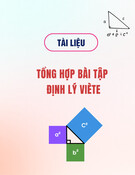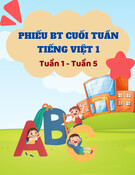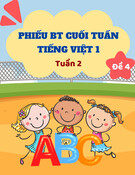
Trường THCS Mạo Khê 2
ĐỀ CƯƠNG ÔN TẬP HỌC KỲ II - TIẾNG ANH 8
(NĂM HỌC: 2023-2024)
I. Vocabulary
Từ vựng unit 7 + unit 8
II. Grammar
1. PAST SIMPLE (thì quá khứ đơn)
a. Từ nhận biết của thì quá khứ đơn.
- yesterday (hôm qua)
- last night/week/month/... (Tối qua/tuần trước/tháng trước..)
- ago (cách đây), (two hours ago: cách đây 2 giờ/ two weeks ago: cách đây 2
ngày...)
- in + thời gian trong quá khứ (e.g: in 1990)
- when: khi (trong câu kể)
b. Mẫu câu:
* Đối với động từ thường
+ Khẳng định
S + v +ed/ v ( bất quy tắc qk)
- Động từ có qui tắc : V-ed
Eg : - work worked
- clean cleaned
*Cách đọc đuôi ed :
- Đuôi ed được đọc là /id/ khi đứng sau t và d :
Eg : wanted needed
- Đuôi ed được đọc là / t / khi đứng sau F, k, p, sh, ch, ss, x,ce
Eg : - stopped, washed, watched, missed, fixed, cooked ...
- Đuôi ed được đọc là d sau các trường hợp còn lại: lived, played…
+.Phủ định : S + didn't + V
I did not live in Ha Noi
+ Nghi vấn : Did + S + V ?
+ có từ để hỏi: wh + did + s + v…?
* Đối với to be: thì/ là ở
+ Khẳng định
S ( I/ He/she/it) + was….
S ( you/we/they) + were ….
+ phủ định
S ( I/ He/she/it) + was + not
S ( you/we/they) + were + not
+ nghi vấn: was / were + S +…….?
+ câu hỏi có từ để hỏi: wh + was / were + S……..?
2. PAST CONTINUOUS TENSE (Quá khứ tiếp diễn)
A. Công thức
a. Khẳng định:
S( I/ he/ she/ it) + was + V-ing

S ( you / we /they ) + were + V-ing
Eg: - She was cooking dinner at 5 p.m yesterday.(Cô ấy đang nấu bữa tối
vào lúc 5h chiều hôm qua)
b. Phủ định:
S + wasn’t/ weren’t + V-ing
Eg:- He wasn’t working when his boss came yesterday.
c. Câu nghi vấn?
Was/ Were + S + V-ing ?
Trả lời: Yes, I/ he/ she/ it + was. – No, I/ he/ she/ it + wasn’t.
Yes, we/ you/ they + were. – No, we/ you/ they +
weren’t.
Eg: Was your mother going to the market at 7 a.m yesterday?
Yes, she was./ No, she wasn’t.
d. Wh - questions
Wh + Was/ Were + S + V-ing ?
Eg: what were you doing at this time yesterday ?
B. Cách dùng và từ nhật biết
- Thì quá khứ tiếp diễn dùng để diễn tả một hành động đang xảy ra tại một
thời điểm xác định trong quá khứ.
* Thường có các cụm từ thời gian sau:
At + giờ + thời gian quá khứ ( yesterday/ last week/ 2 days ago .. )
(At) this time + thời gian quá khứ ( yesterday/ last week/ ..ago .. )
Vào lúc này ………….
At 7 o 'clock last night: vào lúc 7 giờ tối hôm qua
At this time yesterday: vào lúc này ngày hôm qua
At that time = then vào lúc đó
Eg:What were you doing at 8 o’clock last night?
- Dùng để diễn tả một hành động đang xảy ra thì có hành động thứ hai xảy
đến ( thì một hành động khác xen vào). Cách dùng này thường đi với when
When + S + V ( quá khứ đơn )…, S + V ( chia quá khứ tiếp diễn - was /
were + V-ing..)
S + was / were + V-ing.. When S + V ( quá khứ đơn )…….
3. POSSESSIVE PRONOUNS (Đại từ sở hữu)
Đại từ
nhân
xưng
Tính từ sở
hữu
Đại từ sở
hữu Ví dụ
I my mine (của
tôi) His house is big. Mine is small.
you your yours (của
bạn) His house is big. Yours is small.
we our ours (của
chúng tôi) His house is big. Ours is small.
they their theirs (của
họ) His house is big. Theirs is small.
he his his (của anh My house is big. His is small.

ấy)
she her hers (của cô
ấy) His house is big. Hers is small.
it its its (của nó) I have a rabbit. This carrot is its.
- Đại từ sở hữu được sử dụng thay thế cho danh từ đã nhắc ở trước và 1 tính từ sở
hữu (Đại từ sở hữu = Tính từ sở hữu + Danh từ).
Eg: Her cat is black. Mine is grey.
4. REPORTED SPEECH (Câu gián tiếp)
- Tường thuật câu trực tiếp: Giữ nguyên văn câu của người nói/ câu của người nói
được đặt trong ngoặc kép
- Câu gián tiếp: Tường thuật lại câu của người nói giữ nội dung chính và có thể
thay đổi từ ngữ
* Cách đổi từ câu trực tiếp sang gián tiếp
a. Đổi ngôi
- Nếu trong câu trực tiếp là ngôi thứ nhất ( I, me, my, mine...), khi chuyển sang
câu gián tiếp ta đổi về ngôi trùng với chủ ngữ trong mệnh đề chính
Eg: She said, " I am a student." She said that she was a student
- Nếu trong câu trực tiếp là ngôi thứ hai ( you, your, yourself, yours...), ta đổi về
ngôi trùng với người đối thoại với chủ ngữ ở mệnh đề chính ( nếu không rõ người
đối thoại với chủ ngữ là ai thì đổi về ngôi thứ nhât (I)
Eg: She said to him, " you are good." She told him that he was good.
- Nếu trong câu trực tiếp là ngôi thứ ba( he/she/they/him/her/their...), khi sang
câu gián tiếp ta giữ nguyên
Eg: She said, " He played football well." She said that he played football well
- Nếu trong câu trực tiếp là ngôi we, ta đổi thành they
b. Thay đổi về thì: ( Động từ chính lùi một thì)
DIRECT ( trực tiếp) REPORTED ( gián tiếp)
Will Would
Simple present
thì hiện tại đơn
Simple past
Thì quá khứ đơn
Am/ is/ are + going to + V(inf)
thì tương lai gần
Was/ were + going to + V(inf)
Present progressive
thì hiện tại tiếm diễn
Past progressive
Thì quá khứ tiếp diễn
Must Had to
Can Could
May Might
c. Một số thay đổi trạng từ thời gian, nơi chốn
today that day
now then

tonight that night
tomorrow the next day/ the following day/ the day after
next week the following week
next Tuesday the following Tuesday
the day after tomorrow 2 days after / in 2 days' time
this that
these those
here there
d. Cách đổi câu khẳng định, phủ định
- Câu trực tiếp: S + said/ said to/ told sb, " S + V ( chia khẳng định, phủ định )..."
- Câu gián tiếp: S + said/ said to/ told sb + (that) + S + V( chia lùi một thì)......
Eg: She said, " I am a student now." She said that she was a student then.
e. Cách đổi câu hỏi nghi vấn
- Câu trực tiếp: S + asked (sb)/ said..., " câu nghi vấn?"
- câu gián tiếp:
S + asked (sb)
wanted to know + if + S + V( chia dạng khẳng định, lùi một
thì) ......
wondered whether
Eg: Bob asked "Are you happy, Carla?"
Bob asked Carla if/whether she was happy.
f. Cách đổi câu hỏi có từ để hỏi ( wh- questions)
- Câu trực tiếp: S + asked (sb)/ said..., " câu hỏi có từ để hỏi?"
- câu gián tiếp:
S + asked (sb)
wanted to know + wh ( what/where..) + S + V( chia dạng khẳng
định, lùi một thì) ......
wondered
Eg: "Where's your director ?", asked the customer.
The customer asked me where my director was.
She asked me. " what will you do tomorrow?"
She asked me what I would do the next day.
5. ARTICLES (Mạo từ)
- Mạo từ a/an/the luôn đứng trước một danh từ.
6. COMPARATIVE OF ADVERBS. (SO SÁNH CỦA TRẠNG TỪ)
a. Cách thành lập trạng từ chỉ thể cách: Trạng từ chỉ thể cách được dùng để bổ nghĩa
cho động từ. Khi thành lập trạng từ ta thêm đuôi “ly” vào sau tính từ:
ADJ + LY = ADV
b. So sánh hơn của trạng từ
S1 + V + trạng từ ngắn + er + than + S2 + …..
S1 + V+ more + trạng từ dài + S2….

Eg: He runs faster than me. ( Anh ấy chạy nhanh hơn tôi)
He writes more carefully than me. ( Anh ấy viết nhanh hơn tôi.)
III. EXERCISES
*. Choose the words whose underlined part is pronounced differently from
that of the others in each group.
1. A. basket B. pattern C. language D. shape
2. A. product B. gong C. apronD. pottery
3. A. dentist B. engineer C. helicopter D. celebrity
4. A. flight B. director C. journalist D. smiles
5. A. talked B. hoped C. relaxed D. attended
6. A. finished B. reduced C. reported D. stressed
*. Choose the word whose main stressed syllable is placed differently from that
of the other in each group.
1. A. basket B. ethnic C. pattern D. happy
2. A. headscarf B. silver C. design D. apron
3. A. product B. collect C. culture D. custom
* Choose the best answer
1. My brother is a vlogger. He usually makes videos for viewers________ the
internet.
A. for B. to C. about D. on
2. If you work hard and save your money, you can become________ billionaire.
A. the B. an C. a D. Ꝋ
3. I think that schools should have yoga classes________ it can help to reduce
stress.
A. so B. because C. and D. though
4. Jenny wants to become a flight attendant, so she________ to learn English
right now.
A. is trying B. tries C. will try D. has tried
5. My friend, Jenifer said that she________ she________ live without music.
A. thought-couldn’t B. thought-can’t C. thought-could D. think-
couldn’t
6. If you enjoy …….. or ……….. music, you should become a musician.
A. to singing-to making B. singing-making C. to sing-to make D. sing-make
7. You need________ a lot of skills to become a vlogger.
A. to learning B. to be learning C. to learn D. learning
8. ________, we had a good chance to meet a celebrity millionaire, TJ Rockwilder, a
14-year-old musician.
A. Logically B. Normally C. Surely D. Luckily
9. My uncle is a ________. He writes the articles to the local newspaper.
A. journalist B. designer C. flight attendance D. engineer
10. You can________ a good living if you have the right attitude and strategies.
A. have B. make C. do D. take
11. H’Mong women wear headscarves and clothes________ beautiful
embroidery.



![Tài liệu tham khảo Tiếng Anh lớp 8 [mới nhất/hay nhất/chuẩn nhất]](https://cdn.tailieu.vn/images/document/thumbnail/2025/20250806/anhvan.knndl.htc@gmail.com/135x160/54311754535084.jpg)










![Phiếu bài tập cuối tuần Tiếng Việt 1 tuần 2 đề 2: [Hướng dẫn chi tiết]](https://cdn.tailieu.vn/images/document/thumbnail/2025/20250728/thanhha01/135x160/42951755577464.jpg)

